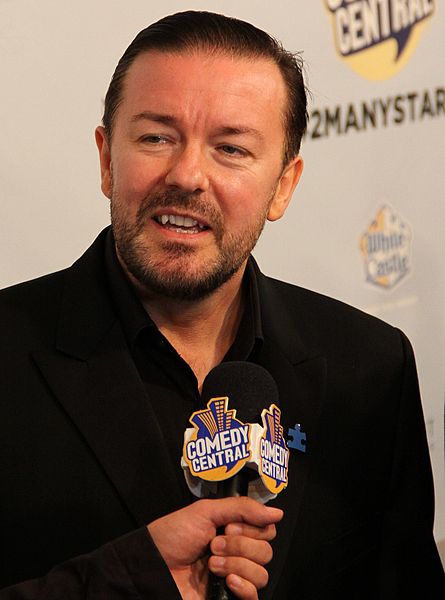David Russell Mosley

Ricky Gervais at Comedy Central’s “Night of Too Many Stars” in 2010.
Date 2 October 2010, 18:20
Source Ricky Gervais at Comedy Central’s “Night of Too Many Stars”
Author Thomas Atilla Lewis at http://www.flickr.com/people/51761894@N00
(CC BY-SA 2.0)
Ordinary Time
Candlemas 2017
The Edge of Elfland
Hudson, New Hampshire
Dear Readers,
As many of you know, I’m quite the fan of Stephen Colbert. I think he’s funny, insightful, genuine, and imperfect. So, when I saw a clip on YouTube from last night’s The Late Show titled, “Ricky Gervais And Stephen Go Head-To-Head On Religion,” I had to watch it. Gervais is well known for his outspoken atheism so I thought, this will be good.
In many ways I was disappointed, and mostly with Gervais. Now, admittedly, they “debated” this in less than 5 minutes, so there’s only so much that can be covered. Colbert begins by asking Gervais why there is something rather than nothing. Gervais rejects the question and says he thinks how is more important. Gervais shows in that one move that philosophy (for that is a philosophical question, even if it leads to theological answers) is not of secondary importance to him, but appears to believe it of no importance. The conversation develops briefly from there covering rather trite atheist arguments.
Gervais has essentially two arguments against the existence of God and one for the supremacy of science: 1. People like Stephen only believe in one God, but disbelieve in the thousands of other gods; Gervais just disbelieves in one God more. 2. Stephen (or people like him) cannot scientifically prove (OK, he doesn’t use the word scientifically, but I’m fairly certain that’s what he means), therefore there’s not a God, probably (Gervais does describe himself as an agnostic atheist since he says no one can know whether or not there is a God). 3. Gervais proves his dependence on science isn’t faith by saying this: If you burnt all works of fiction, in 1000 years they wouldn’t come out in the exact same way. On the other hand, if you burnt all the science textbooks, the experiments would still give the same results.
Now, all of these answers are problematic, but I want to focus on the first and third. Gervais’s first argument is simply that he believes in one less God than a monotheist. I’m fairly certain just writing that sentence made David Bentley Hart shudder in his study. I honestly cannot think of a more asinine argument against God’s existence. So much so that I’ve actually written on it before (What do We Mean by God?). This kind of argument shows a complete lack of understanding of classical theism or how gods and God even work within theological systems. Hell, it’s quite possible both to believe other gods exist (Tolkien’s Valar were often called gods in early drafts) and to believe that there is only one God. They are conceived of as two different kinds of beings (one of them the source and ground of all being and the others created beings).
Gervais’ third point was an attempt to prove that atheism isn’t a belief system and nor is science. Colbert had attempted to point out (and admittedly this argument is a bit trite as well) that the science Gervais was spouting was something he had taken on faith. He believed it because he believed Hawking, et al., were correct. He, obviously, hadn’t done the math or the experiments himself. But Gervais tries to discount this by pointing out that scientific principles will always work and that our experiments will always be repeatable. Apparently Gervais hasn’t been so good about studying the history of science. After all, geocentrism was not, as is so often touted, believed despite the best scientific evidence, but because of the best scientific evidence at the time. Science is constantly changing and the idea that you could burn all the science textbooks currently existing and the science they teach would be precisely the same in a 1000 years is ludicrous, scientistic nonsense.
Now, as I said, this all took place in less than five minutes. So, there’s something to be said about what can be accomplished in that amount of time. Still, that Gervais reverts to such nonsense when asked to briefly debate the existence of God shows that Gervais hasn’t studied his opposition nearly well enough. He needs to actually understand classical theism, if not Christianity, if he’s going to go around telling people why belief in God doesn’t make sense.
UPDATE:
Here’s the video itself, which I forgot to attach.
Sincerely,
David
















